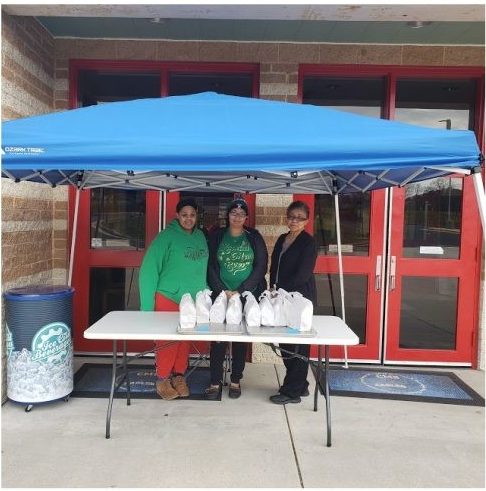Keith Connor is the Supervisor of Nutrition Service for Caroline County Public Schools. Located 30 miles north of Richmond City, Caroline County is home to 4,250 students across five public schools. Since March 17th Caroline County Nutrition Service has been serving curbside breakfasts and lunches, and delivering meals into the county. In just one month of service, Keith Connor and his team served 26,500 meals. Caroline County Nutrition Service will continue to provide the children and students of Caroline County with meals throughout the summer.
What challenges and barriers do children face when accessing food in your community?
Connor: Even though we are doing a combination of curbside service at our schools and making bus runs out into remote areas of our county, the biggest challenge we see right now is getting food to those children that have limited access to our feeding sites and transportation.
How is your organization helping to remove those barriers?

Connor: We truly appreciate the funds we received and those funds were primarily used to cover the increased cost for packaging of the meals. We are doing a two-day meal program now, so when students
come in on Mondays we give them meals for Mondays and Tuesdays, and so on. Packaging multiple meals did increase our costs and the grant funds did help with that. It also helped cover the cost of keeping the meal service open over the spring break when we would have traditionally been closed, so we brought the staff in and paid them over time to cover spring break.
As far as trying to target some of those children in isolated pockets, we are reaching out and working with community groups and different organizations like food banks and churches. Those organizations are providing additional food and other items, like cleaning materials, to be handed out to families that come to our curbside pickups.

Has an interaction with a child or family really moved you? Have you heard a story that’s touched you? If so, please share.
Connor: Actually, you know, I gave this question some thought and of course there are stories about children and families, but you know what the nicest thing I saw is? That while the staff is out there
working, and of course some of the weather isn’t the best, families have been bringing little gifts and goodies for the staff. I thought this was very, very nice. The families we are trying to serve are in turn recognizing the efforts of the staff that are out there trying to take care and feed them.
Can you share any specific numbers around your emergency feeding operation?
Connor: We peaked at 1,800 meals served in one day, which is significant considering our enrollment is 4,000. That peak did happen on a day when the schools handed out learning packages, so we do see a spike on those days. We are running between 1,000-1,800 on a daily basis, averaging about 1,300 children daily. Breakfast and a lunch to each of those.
What would you say to the donors who are making this support possible?
Connor: Tremendous gratitude and real appreciation that we have the resources to help us not just serve the kids, but to serve them in an appropriate way. This includes the little things you may not even think about. For us to have bags to package the food all together, versus walking up to cars and giving items one-by-one, that helps us run our operation smoothly and safely. This support is very, very helpful.
Is there anything else people need to know about how the coronavirus impacts childhood hunger in your community?
Connor: We have been fortunate that there are only 14 reported cases in the county so far, but the stay at home order has had a tremendous impact on our children’s’ ability to come in and get their regular meals. If you compare the number of meals we normally serve on a school day to right now, even with those numbers we are only serving half the kids we would normally serve. The coronavirus has definitely impacted those children. The longer it goes on the greater the need and we have to find ways to reach those children and make sure they are taken care of. Local families will start to feel the pinch. If they are out of work, how long will they be able to grocery shop and feed their family? It will become more challenging the longer it goes on.